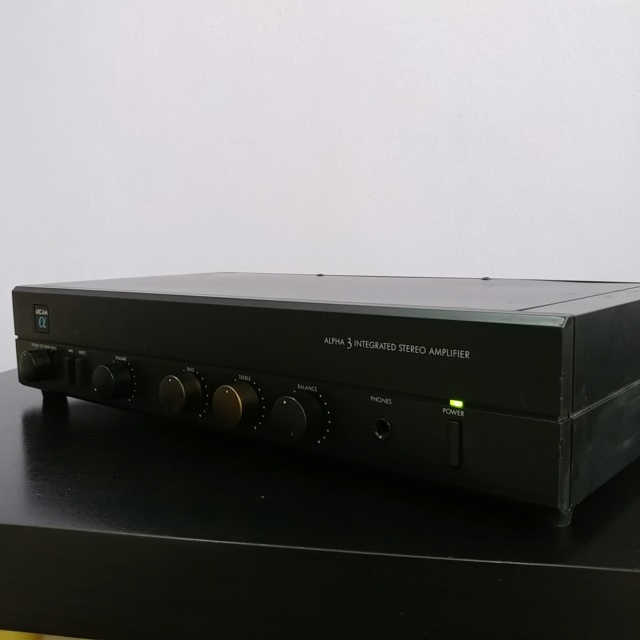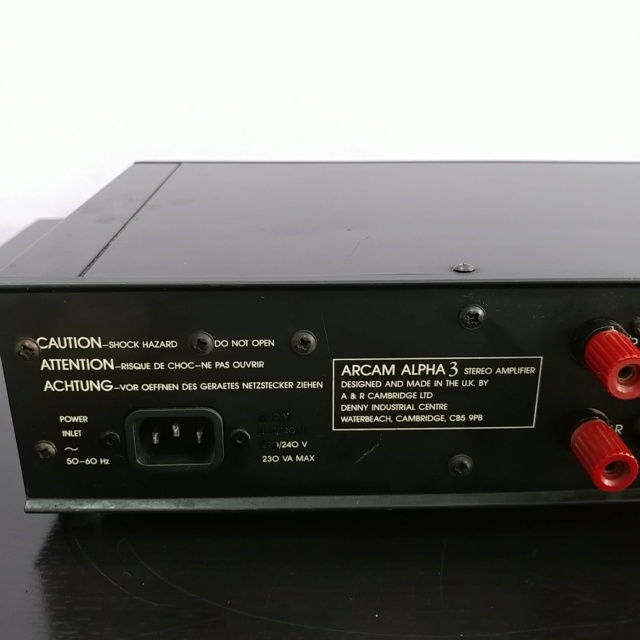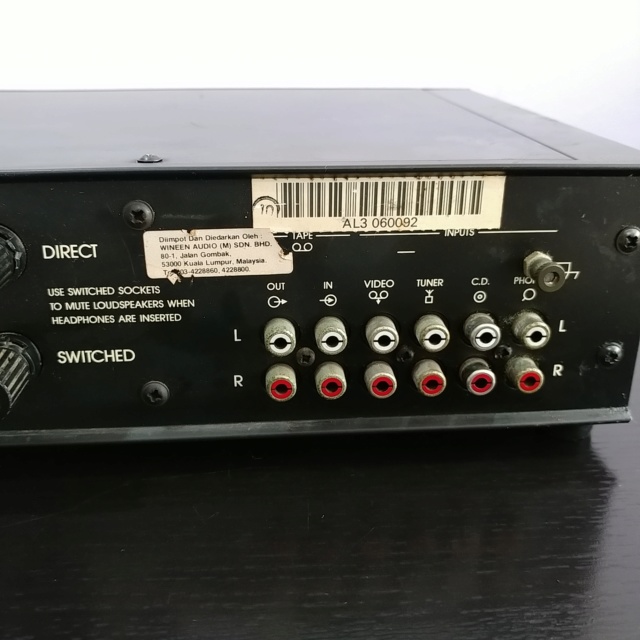Arcam Alpha 3 England Made Stereo Integrated Amplifier with Phono
Hi-Fi 4 Sale - Malaysia / Singapore Audio Forum & Marketplace | www.hifi4sale.net :: Audio & Video Equipment Marketplace :: Audio & Video Equipment: FOR SALE (Pre-owned & Used)
Page 1 of 1
 Arcam Alpha 3 England Made Stereo Integrated Amplifier with Phono
Arcam Alpha 3 England Made Stereo Integrated Amplifier with Phono







Made In England
Price : RM 680
Contact Simon Ting 012-3612507
Power output: 40 watts per channel into 8 ohms
Total harmonic distortion: 0.02% at 30 watts into 8 ohms at tkHz
Frequency response: Phono 60-20,000Hz ±05dB. -3dB at 20Hz
Line inputs I 0-20,000Hz ±05dB
Input sensitivity: Phono 22mV/47k ohms/I O0pF Line inputs 170mV
Signal-to-noise ratio (CCtR): Phono 75dN
Line inputs 95dB
Dimensions (W x H x D): 430 x 84 x 248mm
Weight: 4.0kg
The construction of the Alpha 3 is a fine example of how clever thinking can drastically reduce costs without compromising either strength or appearance. The two side panels are identical lengths of aluminium extrusion, the top and bottom covers are also identical and are held in place by self-tapping screws which engage slots in a pair of identical extruded aluminium heatsinks to which the complementary pairs of output transistors are clamped. Further extrusions form the rear panel and the toroidal power transformer mounting. No heavy press-work is involved, only simple folding, and the Outer front decorative panel is the only plastics moulding.
All the component parts mount on to a single large flow-soldered printed circuit board. Wiring is almost nonexistent, restricted to the leads from the power transformer and green LED indicator, plus a five-way jumper carrying the output signal to and from the headphones socket to the lower pair of loudspeaker terminals. Such accomplished development work is not everyone's forte and of course in this example much advantage has been gained from experience with its predecessor, the Alpha 2. Nevertheless, a detailed examination of the way they have gone about it cannot fail to lead to considerable admiration.
There is nothing special in the circuit arrangements adopted. Much use is made of the widely accepted 5532 audio integrated circuit; signal carrying capacitors are avoided by utilization of direct-coupling, safeguarded by DC feedback. Overthe-top specifications are eschewed in favour of realistic performance limits and the only detectable luxury to my eye was the provision of an IEC threepin mains inlet and its accompanying lead where others might well have settled for a captive, fixed length of flex. This basic approach extends to the simply worded but completely adequate instruction leaflet, although both the layout and the panel legends of the Alpha 3 itself makes its connection and operation very obvious. Apart from the power connection the rear panel houses two pairs of 4mm socket centre terminals, the upper pair offering a direct connection, the lower interruptible by cut-out contacts on the headphones jack socket. Six pairs of phono sockets accommodate the signals from five inputs and provide a tape record output. The latter parallels whatever input has been selected via 1.8k ohms isolating resistors so signal levels can be affected, both by the input impedance of a connected recorder and the source impedance of the input selected. Recording buffer amplifier stages can't be expected at this price level.
The front panel controls are adjusted by small knobs confined to the lower half of the fascia. At the left is a four-position input selector switch; this is lettered Phono, CD, Tuner and Video but the latter three are identical and any line-level input could be routed to any of them. The phono input includes an additional 5532 with feedback around it to provide RIAA compensation and the necessary gain to offer adequate input sensitivity for moving-magnet or the higher output moving-coil cartridges. Alongside this rotary input selector are two push switches; the first selects Tape playback, thus permitting monitoring with a three-head machine; the second, labelled Direct, is included as a concession to the purist and bypasses Bass, Treble and Balance controls which are the three righthand knobs, all having a centre detent. In between is the Volume control. The push switch at the far right is for Power On/Off and the green LED indicator is immediately above it.
How it performed
Measurements largely confirmed the makers' own specifications: sensitivity of the line inputs was a shade low, 175mV being required for 40 watts output from both channels into 8 ohms, Increasing the input produced 45 watts before clipping occurred. The frequency response with the tone controls resting in their notches was remarkably flat, the only deviation a sag of 0.2dB at 20kHz. Interestingly this droop doubled to 04dB with the direct switch engaged – both of course totally irrelevant as far as the listener is concerned. Incidentally, the tone controls are extremely mild in their operation; the specification suggests a maximum range of ±8dB at 50Hz and 15kHz but my sample only yielded rather less than 5dB of lift and slightly more than 3dB of cut at those frequencies.
Listening to a wide variety of music showed the Alpha 3 to be an accomplished performer; make no mistake, Arcam have another winner here. Given loudspeakers of adequate sensitivity such as the B&W 600 Series (reviewed in August and September) it provided a fully-scaled and excellently detailed replication of Alfred Brendel's Beethoven variations and Schumann Symphonic Etudes in the nicely judged acoustic of the Snape Makings (Philips 432 903-2PH). What a joy to hear this eminent pianist's usual outward solemnity retreat behind Beethoven's gently mocking variations on "Rule Britannia". Equally joyous with a very different mien was the latest of EMI's highly successful ventures into the post-war Broadway Musicals, Annie get your gun (CDC7 54206-2, 11/91). How John McGlinn and his team succeed in capturing the 'glitz' of show business in the austere surroundings of the Abbey Road studios is all to do with recording artistry, but some might call it magic. The Alpha 3 presents you with it all, without harshness, sibilance or questionable dynamics. It is an amplifier which seems to be all virtues and no vices, and listenable to a degree.
HiFiLab- Dealer\Reseller\Trader\Service Provider

- Number of posts : 2971
Age : 45
Location : klang
Registration date : 2011-03-12
Character sheet
Source(s):
Amplification:
Speakers:
 Similar topics
Similar topics» Arcam Alpha 9 England Made Stereo Pre-Amplifier
» Arcam Alpha A & R Cambridge integrated amplifier made in England
» A&R Cambridge Arcam Alpha England Stereo Integrated Amplifier
» Arcam Alpha 6 British Stereo Integrated Amplifier With Phono and Remote (Sold)
» Cambridge Audio P40 MKII England Made Stereo Integrated Amplifier with MM MC Phono
» Arcam Alpha A & R Cambridge integrated amplifier made in England
» A&R Cambridge Arcam Alpha England Stereo Integrated Amplifier
» Arcam Alpha 6 British Stereo Integrated Amplifier With Phono and Remote (Sold)
» Cambridge Audio P40 MKII England Made Stereo Integrated Amplifier with MM MC Phono
Hi-Fi 4 Sale - Malaysia / Singapore Audio Forum & Marketplace | www.hifi4sale.net :: Audio & Video Equipment Marketplace :: Audio & Video Equipment: FOR SALE (Pre-owned & Used)
Page 1 of 1
Permissions in this forum:
You cannot reply to topics in this forum








